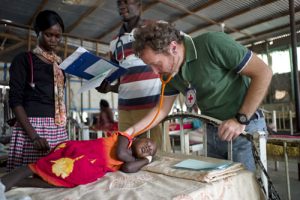Case 8.2: “Ethics and Humanitarian Aid: Vertical Aid Programs”
Introduction
Humanitarian aid highlights tensions in the utilitarian perspective between long- and short-term consequences of actions and policies, and many humanitarian aid workers find themselves acutely torn between deontological and utilitarian ethical perspectives. In this case, Dr. Asadour is a physician attached to a non-governmental organization whose mandate is to participate in a global vertical aid anti-cholera program. Cholera has broken out in a town in South Sudan and the NGO has set up a temporary work station with a Memorandum of Understanding to treat cholera only. Patients with other conditions must be sent to the local hospital, though it is already beyond capacity (Thomas, Waluchow, and Gedge 267).
The Question
As patients line up at the admissions tent, Dr. Asadour must decide whether or not to admit them. Some patients have symptoms that might or might not be cholera, but this cannot be determined unless they are admitted; once admitted, if they do not have cholera, they could nevertheless be treated easily without transfer to the local hospital. The NGO has emergency medical supplies that could save lives of those with non-cholera conditions, such as meningitis. Is it ethical to violate the mandate and treat?
Application:
Challenges Emerging From Resource Scarcity and the Need to Allocate Them
I came across “Ethics in Humanitarian Aid Work: Learning from the Narratives of Humanitarian Health Workers,” a qualitative study drawing on Grounded Theory analysis of 20 interviews with health care professionals who have provided humanitarian assistance; I found the predicaments that it presents to be applicable to this case.
The study reveals that respondents persistently were confronted by situations in which the resources available were insufficient or inadequate—insufficient to sustain life, or inadequate in relation to people’s needs. The choices that scarce resources presented were a recurring source of ethical struggle. Describing her work at an urban hospital in the Caribbean, R19 (RN) said:
“Whenever you see so many sick [people] and you realize that there are some that have to be turned away then you do say okay well we need to triage and we need to decide you know who we’re going to treat” (Schwarz et. al.).
She raised questions about the rightness of vertical aid, yet explained that over time she came to believe that refusing care to some was justified to ensure care for others. In many instances, professionals chose to offer resources to the people perceived to have the best chance of survival (Schwarz et. al.).
Challenges of resource allocation were most acute when patients’ lives were at stake. But care resources for chronic conditions were also scarce. Here, too, respondents faced situations in which they had to choose who would receive care. The deciding itself was often morally difficult, as were the consequences of the decisions. R10 (physical therapist), for instance, brought funds from friends at home to support the health needs of the people in Central America with whom she worked. In one way, she said, money gave her options for problem solving—she might purchase the services of a local person to create a chair that allowed a child with a disability to sit upright, for instance. But in another way, “It created more problems because people had given me all this money in the faith I would do the right thing with it and I didn’t know exactly what the right thing was” (Schwarz et. al.).
Challenges Emerging From Aid Agency Policies and Agendas
Treating people’s chronic conditions is outside the remit of some agencies. In vertical programs, treatment is only provided to individuals who have specified health conditions that match pre-established priorities. Even where adhering to the agency policy was judged on balance to be the ethically correct act, it could still be difficult to do (Schwarz, et. al.).
What about Beneficence?
As we have discussed in class, beneficence demands that we actively promote the well-being of others and prevent or remove harm to them (Vaughn 10). Accordingly, there is little doubt that the health care professionals have such a duty to advance patients’ welfare, promote their well-being, and prevent or remove harm to them. To what extent does the principle of beneficence justify violation of the mandate?
In the Media
TEDxHamburg – Linda Polmann – “What’s Wrong With Humanitarian Aid? A Journalist’s Journey”
This is a general discussion provided by TEDx on the ethical dilemmas associated with humanitarian aid. What, then, is the solution?
Conclusion
Sometimes, refusing care to some is justified to ensure care for others.
In some instances the policy, or following it, is felt to be too significant a violation of other ethical obligations.
The desire to help a particular patient—a woman with diabetes, for example—outweighs an agency directive against providing treatment deemed unsustainable in the context, a situation that tests perceived duties of beneficence against policies on scarce resource allocation.
Works Cited
Schwarz, Lisa, et. al. “Ethics in Humanitarian Aid Work: Learning From the Narratives of Humanitarian Health Workers.” AJOB Empirical Bioethics, 2010, 1(3): 45-54. Web. 9 April 2017.
Thomas, John E., Wilfrid J. Waluchow, and Elisabeth Gedge. “Case 8.2: “Ethics and Humanitarian Aid: Vertical Aid Programs.” Well and good: a case study approach to health care ethics. Peterborough, Ontario: Broadview Press, 2014. Print.
Vaughn, Lewis. Bioethics: Principles, Issues, and Cases. New York: Oxford University Press, 2010. Print.


Elizabeth,
I enjoyed your blog post on humanitarian aid. I agree with your conclusion, that refusing care to some is justified to ensure care to others. “The term ‘rationing’ carries a negative connotation” (Beauchamp 285). The act of rationing is usually avoided. I think it’s important to still address it because rationing is a big issue, especially in humanitarian aid. There are people who will receive care and people who do not receive care. In a perfect world, rationing and allocating would not be a problem. But resources are limited, and we face the dilemma of who to supply the resources to.
In this situation, I believe age should be the initial rationing determinant. Young patients, despite the type of disease, should be admitted. After this, Dr. Asadour can decide, based on his professional opinion, on the severity of the patient’s symptoms. Based on his medical knowledge, he can decide who is admitted into the work station. It is important to try a maintain a neutral bias for all patients.
Sylvie
Citations
Beauchamp, Tom L., and James F. Childress. Principles of Biomedical Ethics. 7th ed. New York: Oxford University Press, 2013. Print.
Hi Elizabeth,
I really enjoyed reading your blog post about humanitarian and specifically the difficulties NGOs in South Sudan faced dealing with the cholera outbreak. This is a very difficult topic to delve into as every human feels sympathetic towards those in need and feels a personal sense of urgency to help in anyway they can, but the truth of the matter is that you can’t help everyone. Sadly, there is just not enough resources to go around. Therefore, I agree with your comments about the principle of beneficence. In order to help those that you are truly there to support, in this example that is the individuals suffering from cholera, then you must turn away others in order to maximize the benefit you can have to those in which it is your duty to treat.
“Humanitarian Aid is aid and action designed to save lives, alleviate suffering and maintain and protect human dignity during and in the aftermath of emergencies” (Project Concern International). However, if the doctors use all of their resources on individuals suffering from diseases such as malaria, they run into the possibility of not being able to treat cholera patients. When reading your blog post, I imagined a situation in which the doctor chose to let in individuals that were not suffering from cholera and then there wasn’t enough space or resources available to help when the people who were suffering from cholera seeked treatment. While I can’t imagine being in the position of the doctors who have to turn away individuals who need help, I think that the doctors must stick to their purpose of being there.
Morgan Brandewie
Works Cited:
Project Concern International. “Providing Humanitarian Aid to All Who Need It.” Humanitarian Aid. Project Concern International, 2017. Web. 10 Apr. 2017.